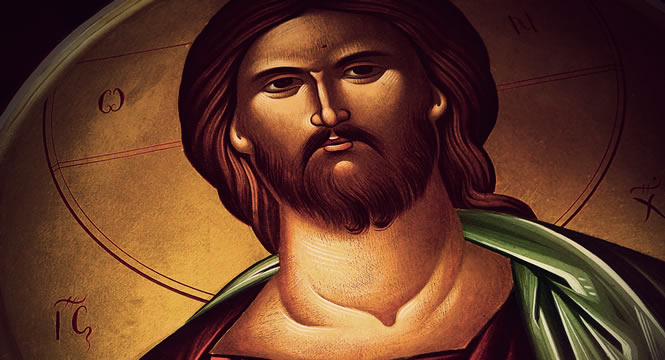By: Justin Angelos, M.A. | December 22, 2024
John 1:1
Θεός ἧν ὁ λόγος
(1:1) “In the Beginning was the word and the word was with God and the Word was God.”
Εν αρχή ἧν ὁ λόγος και ὁ λόγος ἧν προς τον θεόν και θεός ἧν ὁ λόγος
I think this is one of the most important verses in the Gospel of St. John to understand grammatically in English but more importantly in Greek. The Reason is, this verse is always under attack by various non-Christian religious groups and even faiths who claim to be Christian but, do not accept Jesus Christ as God the Son (The second person of the Trinity). The two words I want to focus on is “God” and “Word” or Θεός ἧν ὁ Λόγος. What I am going to focus on is the grammatical construct of John 1:1 and the bit of the history behind ὁ λόγος.
John 1:1 and Genesis 1:1
In Ancient Greek literature there is no difference in meaning between the two-word adverbial Phrase Ἐν ἀρχη and the three-word adverbial phrase Ἐν τη ἀρχη but Ἐν ἀρχη is used more frequently. Ἐν ἀρχη parallels Genesis 1:1 Ἐν ἀρχη ἐπιοησεν ὁ Θεος [1] In the beginning God created.
The Historical Background of ὁ Λόγος
John may have written his gospel in Ephesus the birthplace of Greek philosopher ῾Ηράκλειτος who lived around 500 B.C. He taught that λογος was eternal, and it could be compared to fire and gives life to everything in the universe; and this was taught well into the first century.[2]
Λόγος word
The Greek Term λόγος is found in a number of different English words like logic, logical, prologue, epilogue etc. It can also have a number of different senses like, word, reason, cause, reasoning etc.
Λόγος is associated with “Spoken Word” but λόγος in John 1:1 does not mean word in the sense of a “word” found in a dictionary. The Greek term for word is λέξις which is where we get our English word lexicon from. The ὁ λόγος in John 1:1 in a person [3]
John was writing to a Hellenized audience he places Jesus as the ὁ λόγος he did this in the most effective by placing Jesus as the ὁ λόγος at the beginning of his gospel.[4]
The Grammatical Construct of John 1:1
Προς + the accusative Τον Θεόν means “with God” Paul writes, ἐν μορφῃ Θεού ἰσα Θεῳ, “In the form of God, equal with God” (Phil. 2:6).
Προς Τον Θεόν literally means “With the God” The use of the article Τον “the” before a noun identifies that noun and in this case “the God” means “God the Father” by reiterating The conjunction και in και Θεός ἧν ὁ λόγος John is placing emphasis on this ὁ λόγος he describes in his gospel, in addition to being from eternity with Θεός is also Himself Θεός. [5]
The word order is reversed in English, in English it reads “and the word was God” but in Greek it reads, “And God was the Word.”
Θεός ἧν ὁ λόγος
John 1:1 this clause has two nouns Θεός ἧν ὁ λόγος One noun is Θεος and the other is λόγος. Λογος has an article, ὁ λόγος which means it is an articular noun and Θεος has no article so it is called and anarthrous noun. The articular noun is identified by the definite article “ὁ” as the subject. And the rest of the clause is the predicate. [6]
So, the predicate noun and a linking verb which is ἧν (was) the linking verb connects the subject (ὁ λόγος) to the predicate noun (Θεός) Θεός adjectivally describes ὁ λόγος. In essence ὁ λόγος was with all the attributes, essence, nature, and qualities of Θεός.
This article is not intended to be a full comprehensive explanation due to the how in depth this subject can go. John was very intentional about describing Jesus as God the Son, the second person of the Trinity.
I want to seriously encourage Christians to study Greek, and there are a lot of really good resources out there. I believe there is a strong need for the use of Greek, especially when it comes to defending the Deity of Christ.
About the Author
Justin Angelos, M.A.

Seattle native Justin Angelos brings a passion for evangelism and discipleship along with theology and apologetics. He has studied at Biola University and Liberty University and recently earned a Master of Arts in Apologetics from Biola University. Justin focuses on providing help for those who suffer from emotional and anxiety issues. He currently resides in Salt Lake City, Utah.
Notes
“17. the Heraclitean Logos.” The Center for Hellenic Studies. Accessed December 8, 2024. https://chs.harvard.edu/chapter/17-the-heraclitean-logos/.
Zachariah, Philemon. “About.” Greek Linguistics. Accessed December 8, 2024. https://greeklinguistics.net/about/.
[1] “Philemon, Zachariou Greek Pronunciation John 1:1.” YouTube. YouTube, n.d. Accessed November 20, 2024. https://www.youtube.com/watch?v=7IkIgSpCgtM.
[1] Zachariah, Philemon. “About.” Greek Linguistics. Accessed December 8, 2024. https://greeklinguistics.net/about/.
[2] “Philemon, Zachariou Greek Pronunciation John 1:1.” YouTube. YouTube, n.d. Accessed November 20, 2024. https://www.youtube.com/watch?v=7IkIgSpCgtM.
[3] Zachariou
[4] Zachariou
[5] Ζαχαρίου
[6] Ζαχαρίου





